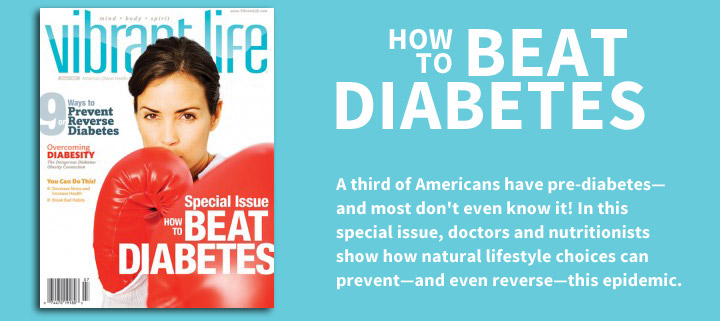A third of Americans have pre-diabetes—and most don’t even know it! In this special issue, doctors and nutritionists show how natural lifestyle choices can prevent—and even reverse—this epidemic. Order online now at www.AdventistBookCenter.com
Tag: Diabetes
Vegetarian Nutrition
What’s the safest way to shed excess pounds, avoid high cholesterol and heart disease, and even cut your risk for certain types of cancer? “With a vegetarian diet,” says author Neal Barnard, M.D. “It’s the most powerful prescription for health I can suggest.”
Although the average vegetarian is slimmer and healthier than the average meat-eater, says Dr. Barnard, there is still a good deal of skepticism that an entirely vegetarian diet can provide complete nutrition. After all, in 1928 presidential candidate Herbert Hoover rallied supporters by promising “a chicken in every pot.” The dream realized, Americans are more out of shape than ever, with obesity, diabetes, heart disease, and other diet-driven illnesses claiming many thousands of lives each year. So what if we traded those chickens for spaghetti marinara, veggie burgers, lentil soup, or even a bean burrito? Would we turn the tide on many chronic illnesses? Physicians and dietitians say yes.
Read more about Vegetarian Nutrition …
Diabetes Help Online
The amount of online information on diabetes is staggering. The search engines Google and AltaVista each brought up thousands of entries. More than 500 Web sites are devoted to the subject. Research is ongoing. New products for diabetics appear almost daily. How does one keep up with the explosive expansion of cyberspace?
Read more about Diabetes Help Online …
Type II Diabetes
Type II diabetes is becoming more and more common. However, there’s encouraging news on how to manage this disease better if you already have it–and ways to avoid it if you don’t.
To begin, Type II (also known as adult-onset diabetes) accounts for 95 percent of diabetes cases in the United States. Now there’s solid evidence that patients themselves hold the key to improving their health, and that the improvements they experience are often dramatic.
In a groundbreaking study at the University of South Carolina’s Norman J. Arnold School of Public Health in Columbia, researchers have found that lifestyle intervention focusing on exercise and modest weight loss worked nearly twice as well as medication did.
Stevia
Stevia rebaudiana—commonly known as stevia, sweetleaf, sugarleaf, the sweet herb of Paraguay—has remarkably sweet leaves. At a time when alternative sweeteners are in strong demand, stevia appears on stage as a big player. This sugar substitute is natural (nonsynthetic) and has zero calories.
In addition, water extracts of stevia are up to 300 times sweeter than sucrose, and the taste lasts longer than sucrose. The sweet taste is a result of two similar glycosides (stevioside and rebaudioside A) that are found in the plant’s leaves.
Read more about Stevia …
A Top Doctor’s Advice on How to Fight Diabetes
Vibrant Life: Give us an idea of the scope of the diabetes problem.
Dr. Barnard: It is reaching epidemic levels. There are 200 million people or more who have it. Year by year it gets more common. The Centers for Disease Control and Prevention in Atlanta estimates that children born since the year 2000 have a one in three risk of developing diabetes at some point in their lives. Most of them will not develop it as children but as adults, but one in three is an astronomical figure we’ve never had before.
Read more about A Top Doctor’s Advice on How to Fight Diabetes …
The Cholesterol War
The battle has begun! My body has declared war on me, and I’ve gone into fighting mode. What else can I do when my doctor tells me that I have high cholesterol? It’s just one more health problem to add to my existing diabetes and hypothyroid issues. And all I keep wondering is: Where did I go wrong? How is it that I’m only twenty-seven and I already have all these health problems?
However, one good thing is that I have a really great doctor, and she’s giving me three months to attempt to get my cholesterol down on my own. She knows how proactive I am about taking care of my body. Many doctors would prescribe a pill and let it go at that, but she’s giving me a chance. The downside is that we’re just starting the holiday season. Could it have come at a worse time?
Happy Healthy Heart
“Heart disease and stroke is the world’s largest killer, claiming 17.5 million lives each year,” according to the World Heart Federation. They state: “That’s why World Heart Day was created, to create public awareness of risk factors for heart disease and stroke and to promote preventive measures.” And this year World Heart Day is celebrated on Sunday September 30 with a theme entitled “Team Up for Healthy Hearts.” What a great cause!
You know we’re all affected by disease and I bet if you thought long and hard enough you could think of someone you know who suffers from heart disease. It certainly hits home for me. In fact, it recently affected my father in a major way. Let me explain. My dad is truly amazing. He’s seventy-four years young and is one of the most active men I’ve ever known. All his life he’s worked hard and been physically active. Maybe he’s never gone to the gym to pump iron, but after an entire day’s work of farming and landscaping I don’t think he really needed to clock time in at the gym! Even now he hasn’t slowed down. He still works three jobs! Isn’t that incredible? He puts me to shame and I’m over forty years younger than he. He’s the picture of health concerning his diet and lifestyle. He doesn’t smoke or drink. He’s a vegan and all of his meals include lots of whole grains, fruits, and vegetables. If we all took such good care of ourselves the world would be a healthier place.
Cinnamon
Cinnamon has been used for centuries both as a culinary spice and for medicinal and other purposes. The ancient Egyptians included cinnamon in their embalming mixture. Moses combined cassia (cinnamon) and other spices with olive oil to anoint the tabernacle and its furnishings.
Origins
The name cinnamon is derived from a Greek word meaning sweet wood. It’s made from the inner bark of the cinnamon tree—an evergreen of the Laurel family. The rolled bark is allowed to dry, forming a scroll or quill. The quills are then cut into two- to three-inch sticks or ground into powder. The ground cinnamon has a stronger flavor than the sticks and can stay fresh for six months, while the scrolls last longer. Both should be stored in a cool, dark, and dry place.
Read more about Cinnamon …



